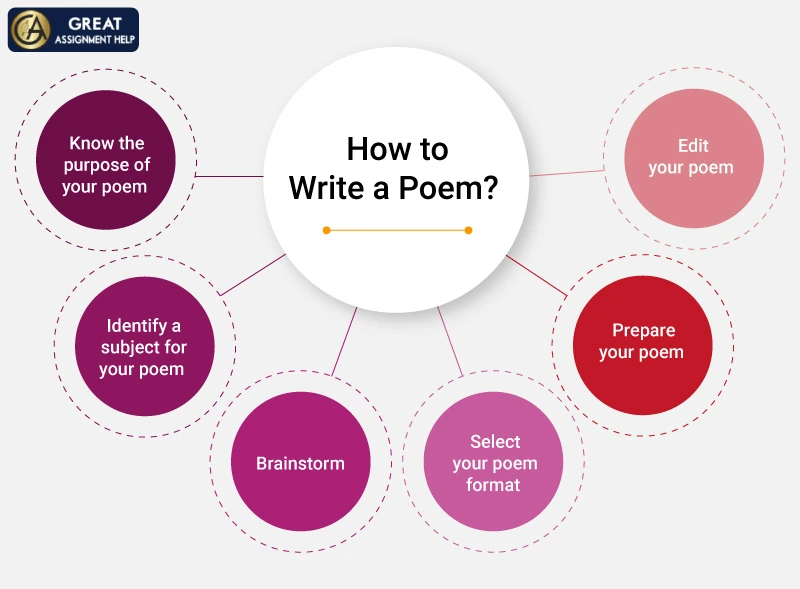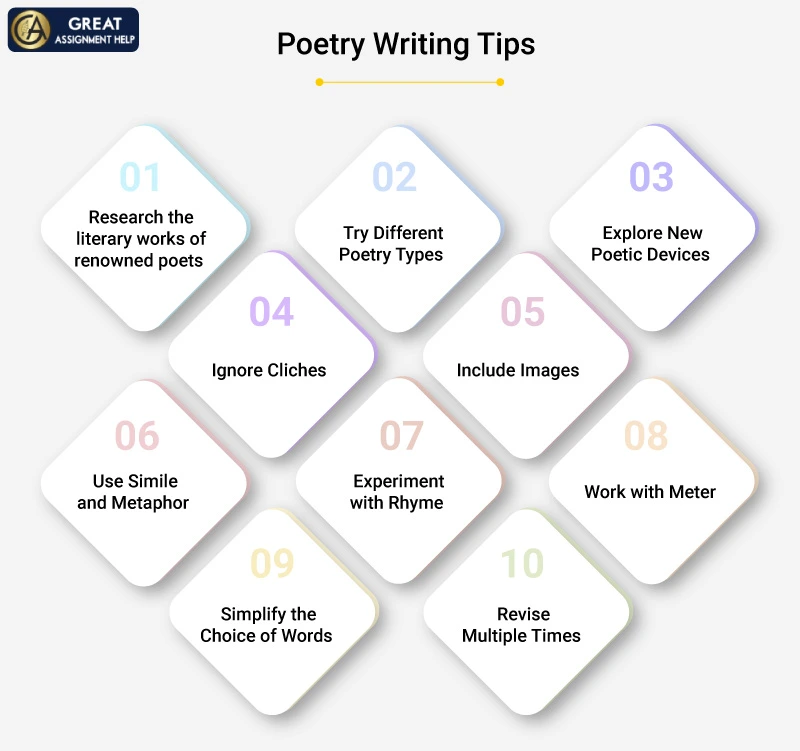Poetry is a kind of creative writing that gives liberty to express one’s thoughts and feelings. In specific, through poetry, you can share your own experience or generate emotions in your readers about any specific topic. Often, established writers and poets will use different poetic devices and literary techniques to craft poems of various types and styles. In case, you are a beginner who is unsure of how to write a poem that is appealing to your readers, continue reading this blog. Here, for your better understanding, we have shared some effective poetry-writing tips that will assist you in creating an impressive and original poem.
Basically, the poem is a free form of writing that doesn’t have any rules. Hence, it can be composed with the help of wordplay and creativity. Moreover, when it comes to writing a poem about your own experience, you need not follow any poem-writing tips. You can just go with your own flow and write what feels right to you. However, for preparing a poem in the literary context, you need to stick to certain poem writing formats and styles.
Let’s get started to know about poetry writing.
What is a Poem?
A poem is a collection of words that are arranged in a certain manner to express an emotion, feeling, or idea in a concentrated style. It never follows the format of standard prose or speech. Usually, a poem is written in verses instead of paragraphs and contains either incomplete or complete sentences. Often a poem has a rhyme, but it is not mandatory.
Steps for Writing an Outstanding Poem
Poem writing is an exciting and challenging task to handle. It might be frightening for you to craft your first poem. But if you follow the below-mentioned poem writing steps, then you can easily write a successful poem.
- Know the purpose of your poem
- Identify a subject for your poem
- Brainstorm
- Select your poem format
- Prepare your poem
- Edit your poem
Know the purpose of your poem
First, have a clear idea of why you want to write the poem and what you want to include in it. The format, style, length, and language type of your poem can all be easily determined if you are aware of its true purpose.
Identify a subject for your poem
The main idea of your poem, or subject, is what the poem is really about. Therefore, you should conduct research and determine the topic of your poem prior to writing it. Keep in mind that identifying a subject beforehand will help you focus on it.
Most of the time, your teacher will give you some poetry prompts or will ask you to write a poem about something that interests you.
Listed below are some popular poetry subjects that you can consider for poem writing.
- An emotion like love, fear, or any other.
- A feeling such as rejection, acceptance, etc.
- An animal
- A person
- An object
- A place
- A time
Brainstorm
Imagine and write down every word, person, and thing that comes to mind when you think of the subject of your poem after you have chosen one. Consider all of these concepts and examine them from various perspectives. When you have finished brainstorming, begin writing a poem about the topic you chose.
Select your poem format
The tone and subject of the poem essentially determine the poem’s format. You shouldn’t worry too much about the poem’s style or format now that you’re just starting out. You can simply select any kind of poem and adhere to the poetry format that works best for you.
Free verse, acrostic poems, haiku, narrative poems, I am poems, and rhyming couplet poems are some common types of poems and poetry styles for beginners.
Prepare your poem
Start writing a poem after determining the format, subject, and purpose. When you write, you can take any route, either forward or backward. For instance, you might start by writing the poem’s title, and opening, or closing lines, and then fill in the rest of the lines by moving forward or backward.
Never give too much thought to the formatting of your poem when you are writing the first draft. Later, you can structure and format your poem.
Edit your poem
After you have completed the first draft of your poem, edit any spelling or punctuation errors in the content. Additionally, you can request feedback on your poem from any of your loved ones or friends. You can make changes to your poem and prepare a final draft based on their criticisms. Keep in mind that your poem’s final draft should be flawless, original, and properly formatted.
You can make as many changes as you want until you are happy with your writing. It is said that you should only finish the poem if you enjoy it.
Important Poetry Writing Tips
Poetry writing is an art that requires more creativity and knowledge. In general, not everyone can write a perfect or good poem. But by following the below-mentioned poetry writing tips you can write an engaging and appealing poem.
Research the literary works of renowned poets
If you want to improve your poetry writing skills, then read the poems written by a variety of poets. Generally, when you read the literary works and poetry collections of great poets and contemporary poets, you can clearly understand their poetry techniques, languages, and styles. Remember, exposing yourself to a new voice would help you to build your poem-writing skills.
Try Different Poetry Types
In general, the poems are of different types. But in order to tune your poetry writing skills, try writing different types of poems. For example, you can write a short poem like haiku, nursery rhymes, a long narrative poem in free verse, etc. When you keep on writing poems in different forms, then you yourself can find a new poetry type that matches your style and also can update your poem-writing skills.
Explore New Poetic Devices
The literary devices and poetic techniques add value to a poem. For instance, you can play with assonance or alliteration to include a new sound variety in your work. Also, you can explore extended metaphors or work with synecdoche to bring new meaning to your work. If you want your poem to stand unique in the crowd, research various poetic devices and implement them coherently in your poem.
Ignore Cliches
A cliche is defined as an overused phrase or opinion that ruins the originality of a poem and dulls its meaning. Remember, when a poem is written without any clichés, then it reflects the effort of the poet, and also it will be treated as original. So, whenever you write a poem, avoid using clichés.
Include Images
When writing a poem, play with words creatively. Most importantly, the poem you write should stimulate senses such as touch, smell, taste, sight, and hearing. Be imaginative and add fresh images to your poem. When you stay imaginative, your poem will reflect your ideas in a more unique way.
Use Simile and Metaphor
To bring imagery and concrete words into your writing, use metaphor and simile. A metaphor is a poetic device that pretends one thing is something else, while a simile says one object is similar to another object. Basically, comparison, suggestion, and inference are important attributes of the poem. So, in order to enhance all these attributes, use poetic tools like simile and metaphor in your poem.
Experiment with Rhyme
Rhyme is one of the important poetic devices that provide a new sound or musical effect to your poem. Generally, using a rhyming scheme in the poem would easily make the readers remember the poem. But at times, using an incorrect rhyme in the poem would diminish the poem’s quality. So, be careful when choosing a rhyming scheme for your poem.
Work with Meter
Meter defines the pattern of stressed and unstressed syllables from line to line in a poem. When you experiment with different meter types in your poem, you can make your poem rhythmically interesting and add multiple layers to your work. Therefore, while writing a poem, try to work with various types of meters.
Simplify the Choice of Words
As you are a beginner, avoid writing complex concepts with deeper meaning using abstract words and flowery language. To create a great poem, it is enough to use simple language with clear and concrete images. Also, never rely on a thesaurus to spot the right words for your poems. If you find yourself overwriting, tune your language and focus only on clear and simple verses.
Revise Multiple Times
Good poetry is created only after multiple revisions. So, after you have completed writing the first draft of your poem, revise and edit it, until you are satisfied with what you have written.
Wrapping Up
Hopefully, by now, you will have learned how to write an excellent poem. Whenever your professor asks you to submit a poem as a part of your English literature assignment, make sure to follow the poetry writing tips suggested above. Remember, you can’t come up with a captivating poem in the first attempt itself. So, keep on practicing to improve your poetry writing skills. In case, you find it troublesome to do your poem writing assignments, reach out to us quickly.
On our platform, we have numerous academic writers who are skilled at composing poems to offer English assignment help on poetry. As per your needs, our professionals will provide high-quality poem assignment writing services online at a nominal price without plagiarism and will help you achieve top grades.
Instead of pressurizing yourself, simply book your order on our portal to get your work done before the deadline.





